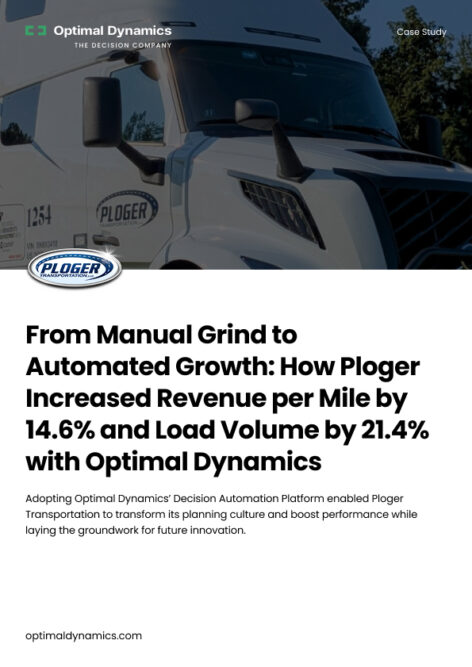Ploger Transportation has successfully enhanced its operational efficiency and revenue generation by implementing Optimal Dynamics’ Decision Automation Platform. The carrier reported a remarkable 14.6% increase in weekly revenue per mile and a 21.4% rise in load volume. This transformation comes at a critical time when escalating costs and a competitive market demand more intelligent decision-making in freight logistics.
To navigate these challenges, Ploger Transportation shifted from traditional methods reliant on spreadsheets and manual dispatching to a more sophisticated, data-driven approach. The Decision Automation Platform allows for continuous optimization, enabling the company to make informed decisions that have a direct impact on profitability and operational performance.
The integration of this advanced technology not only streamlined planning processes but also fostered a culture of innovation within the organization. By automating dispatching and spot-freight sourcing, Ploger has been able to drive consistent, profitable decision-making. This strategic change has resulted in improved satisfaction for both drivers and customers, as operational efficiencies translate into better service delivery.
Transforming Planning Culture
The transition to automation was not merely a technological upgrade; it also involved significant change management. Ploger Transportation undertook extensive training to help planners trust and adopt the automated recommendations provided by the platform. This commitment to change has been essential in overcoming initial resistance and ensuring effective utilization of the new system.
The quantifiable outcomes of this shift are compelling. With a 14.6% increase in revenue per mile, the company has not only enhanced its profitability but also laid a robust foundation for sustainable growth. The 21.4% increase in load volume further signifies the effectiveness of the automation in meeting market demands more efficiently.
Ploger’s case study highlights the importance of embracing technology in the logistics sector, particularly as the industry faces ongoing pressures from rising operational costs. By adopting a strategic approach to decision automation, Ploger Transportation has positioned itself as a leader in the freight market, demonstrating that technology can drive significant improvements in both efficiency and customer satisfaction.
For those interested in understanding the full impact of this transformation, the complete case study is available for download, offering detailed insights into the steps taken and the results achieved. The findings underscore the growing necessity for companies in the logistics industry to leverage technology to remain competitive and responsive to market dynamics.







